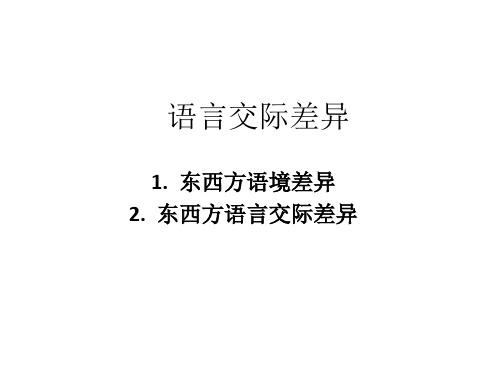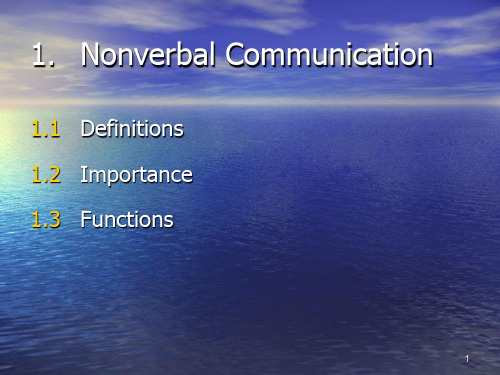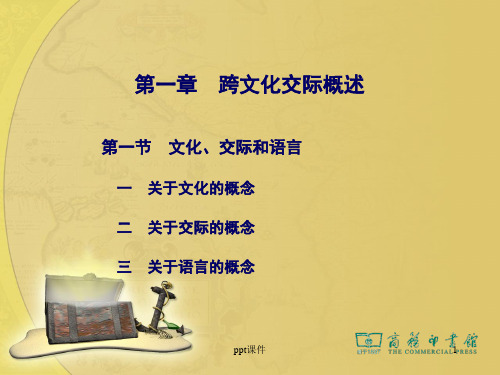跨文化交际 ppt课件
合集下载
跨文化交际 ppt课件

美国人的会话风格
• 其主流语言风格被视为“体谅模式”,主要以 加州为主。
• 另一种语言风格为“参与模式”,以纽约为主 。
交际方式
• 东方人采取单向的保龄球方式。 • 西方人采取的是双向的乒乓球式。
非语言交际差异
非语言交际的定义
• 在交际过程中不是用口头或文字形式进行 信息传递的沟通方式即为非语言交际
• A lucky dog. • As faithful as a dog. 走狗 • Work as hard as a dog. 老黄牛 • 汉语:狗急跳墙,狗血喷头,狗眼看人低,
狗拿耗子多管闲事,狗嘴里吐不出象牙。狗 咬吕洞宾,不识好人心。
(美国)象征着死亡,祭奠亡灵和扫墓时 使用,相当于菊花。(主要用于复活节)
讨论: 鱼在英语中的含义?
• Fish in the air • 水中捞月 • A poor fish • 可怜虫 • A loose fish • 放荡不羁者 • A small fish
颜色词的文化差异,如红色、白色和黄色。 • 红色:happy, health,luck. 红对联、红包、红
3. What’s up? Can’t complain./Same as usual.
2. 东西方称呼语差异
• 东方人在称呼上更强调地位、辈份和身份。 • 西方人则更突出性别和婚姻。 • 东方人通常将姓氏放在名字的前面。 • 亚洲许多国家例如中国、韩国、越南,女
性婚后一般不随夫姓。
• 西方人大多习惯将名字放在姓氏之前,在 西方文化中,女人结婚后要随其丈夫的姓 氏。
• 这一部分需要大家课后去搜索:请找出尽 可能多的手势差异,如ok的手势语,竖起 大拇指的手势语等。
跨文化交际障碍
大学跨文化交际ppt课件

3. 面对分歧与冲突:尊重对方观点,妥善 处理分歧,学会妥协与包容。
05
06
4. 实践建议:加强语言学习,提高沟通技 巧,主动参与社交活动,保持开放心态。
05
跨文化交际能力的培养与提升
增强文化意识与敏感度
01
了解不同文化的价值 观和世界观
深入了解不同文化的价值观和世界观 ,可以帮助我们更好地理解其他文化 ,避免跨文化交际中的误解和冲突。
发展
随着全球化的深入,跨文化交际研究逐渐涉及更多 领域,包括语言学、心理学、管理学等。
当代趋势
如今,跨文化交际能力被越来越多的行业和 领域视为必备技能,如国际商务、外交、教 育等。
02
跨文化交际的核心能力
文化敏感度
01 意识到文化差异的存在
02 理解和尊重文化差异
03
愿意学习和适应不同文化
语言能力
02
关注文化细节
在跨文化交际中,细节往往可以反映 出一个人的文化背景和习惯。增强对 文化细节的敏感度,可以帮助我们更 好地适应不同的文化环境。
03
培养文化包容心态
接受并尊重不同文化的差异,以包容 的心态去面对其他文化,可以增强我 们的文化意识,提高跨文化交际能力 。
提高语言能力与交际技巧
Hale Waihona Puke 学习目标语言在不同文化环境中进行决策和解 决问题的能力
03
在不同文化环境中处理冲突和压 力的能力
04
03
跨文化交际的挑战与应对策略
文化冲击与文化适应困难
总结词
文化冲击是指人们在接触另一种文化时,由于价值观、信仰、习惯等方面的差异,产生的困惑、恐惧和不安。
详细描述
文化冲击的症状包括孤独感、思乡病、易怒和焦虑等。适应新文化需要时间,正确认识和接受这种变化是克服文 化冲击的关键。
跨文化交际概述PPT课件

• A: Okay, thanks for the information, Let’s get together soon.
• B: I’d love to. • A: Good, I’ll give you a call and we’ll make a date for
lunch. • B: If you want, we can make a date now. When are
• 大众交际(mass communication)一般定义为职业化 的传播机构利用机械化、电子化的技术手段向不特定 的多数人传送信息的行为或过程。
三、交际的要素
• 一个完整的交际过程包含了九项要素: 传送者、制码、讯息、通道、接收者、 解码、回馈、环境及噪音。
四、交际的模式
• 语言是人类最重要的交际工具。 • 语言是人类最重要的思维工具。 • 语言是文化的载体。
农民peasant 龙dragon
凤凰phoenix 猫头鹰owl
孔雀peacock 狗dog
• A、B概念意义相同,A有内涵意义,B无内涵意 义
松柏鹤桃 pine /cypress/crane/peach 梅兰竹菊plum
blossom/orchid/bamboo/chrysanthemum 数字
二、交际的种类
• 内向交际(intrapersonal communication)指一个 人自己脑子里在自我交流活动或是自言自语。
• 人际交际(interpersonal communication)两个人 或两个人以上的信息传受过程。
• 组织交际(organizational communication)在学校、 公司、工厂、机关、军队、党派、群众团体等内部的 传播是组织交际。
跨文化交际PPT演示课件

23
3. Space and Distance
3.1 Proxemics 3.2 Attitudes Toward Crowding
24
3.1 Proxemics
✓ Definition: the study of people’s perception and use of space.
✓ Four categories: intimate, personal, social, and public distance.
26
Categories of Distance (cont’d)
• Social Distance (1.3-3m) - colleagues, business partners, people at social gatherings
• Public Distance (beyond 3m) - speaking in public
- direct intrusion into others’ affairs • Shrugging shoulders
- indifferent, powerless, having no secret to conceal
19
Postures (cont’d)
• Follow one’s natural habits so often go unnoticed (subconscious in nature)
• May damage your image if you neglect your postures
20
2.4 Eye Contact
Direct eye contact • Chinese: avoid • North Americans: appreciate • The British: avoid
3. Space and Distance
3.1 Proxemics 3.2 Attitudes Toward Crowding
24
3.1 Proxemics
✓ Definition: the study of people’s perception and use of space.
✓ Four categories: intimate, personal, social, and public distance.
26
Categories of Distance (cont’d)
• Social Distance (1.3-3m) - colleagues, business partners, people at social gatherings
• Public Distance (beyond 3m) - speaking in public
- direct intrusion into others’ affairs • Shrugging shoulders
- indifferent, powerless, having no secret to conceal
19
Postures (cont’d)
• Follow one’s natural habits so often go unnoticed (subconscious in nature)
• May damage your image if you neglect your postures
20
2.4 Eye Contact
Direct eye contact • Chinese: avoid • North Americans: appreciate • The British: avoid
《跨文化交际》课件

跨国企业的跨文化团队建设案例
总结词
跨国企业通过跨文化团队建设,实现文化融合与协同发展。
详细描述
某跨国企业为应对不同国家和地区的文化和市场差异,组建了由不同国籍员工组成的跨文化团队。通过培训、交 流活动等方式,促进员工之间的文化了解与合作,实现了企业业务的快速发展。
国际旅游中的跨文化冲突解决案例
总结词
教师需要关注学生的文化背景和个性特点,采用多样化 的教学方法和手段,促进学生的学习和发展。
教育机构需要提供跨文化交际的培训和教育,帮助学生 和教师了解不同文化的特点和差异。
教育中的跨文化交际有助于培养具有国际视野和跨文化 交际能力的人才,推动全球化和文化交流。
国际关系中的跨文化交际
01
国际关系中的跨文化交际是指在不同国家之间进行有效的沟通和合作 。
THቤተ መጻሕፍቲ ባይዱNKS
感谢观看
02
CATALOGUE
文化差异的表现
语言差异
语言差异是跨文化交际中最为直观的表现。不同文化背景的 人们使用不同的语言,这可能导致沟通障碍。例如,某些词 汇在一种文化中可能有特定的含义,而在另一种文化中可能 没有。
语言使用的习惯和规则也因文化而异,如敬语的使用、礼貌 的表达方式等。了解和尊重这些差异是进行有效跨文化交际 的关键。
详细描述
某高校开展国际交流项目,邀请不同国家和地区的留学生和学者参与学术交流、文化体 验等活动。通过这些项目,学生和学者增进了对不同文化的了解,促进了国际合作与友
谊。
国际组织中的跨文化沟通案例
总结词
国际组织中的跨文化沟通,推动全球议题的 解决。
详细描述
某国际组织在处理全球性议题时,注重跨文 化沟通与合作。组织成员来自不同国家和地 区,拥有不同的文化背景和观念。通过有效 的跨文化沟通,成员们达成共识,推动了全 球性议题的解决。
《跨文化交际》课件

2
基本规则
了解跨文化交际的基本规则,如注重非语言沟通、避免使用俚语和难懂的语言等方的文化背景和习惯,调整沟通策略,确保信息的准确传达。
解决跨文化交际中的问题
1 展示文化敏感性
在跨文化交际中,需要对不同文化背景的人 表示尊重和理解。
2 调整沟通策略
针对跨文化交际中遇到的问题,我们可以根 据对方的习惯和背景,调整沟通策略,解决 问题。
案例研究
跨文化交际成功案例
一位跨国公司的领导成功地进行了跨文化沟通,在 不同国家的员工中建立了良好的合作关系。
跨文化交际失败案例
因为文化差异,一个国际项目中的交流出现了误解 导致该项目未能按时完成。
总结与讨论
反思课程内容
通过本课程的学习,您是否更好地了解了跨文化交际的重要性和技巧?
提出问题和建议
《跨文化交际》PPT课件
本课程旨在帮助您更好地了解跨文化交际的重要性和技巧,并掌握如何有效 地与不同文化背景的人交流。
什么是跨文化交际?
定义
跨文化交际是指在跨越不同文化背景的情况下进行的交流和互动。
重要性
随着全球化进程的加快,跨文化交际的重要性越来越受到重视。
挑战
不同文化之间的交流可能会面临很多挑战和障碍,需要我们采取有效的沟通策略。
在跨文化交际的实践中,您是否遇到了问题?为了更好地提高跨文化交际的能力,您有什么 建议?
文化差异
不同的文化特征
每个文化都有自己独特的特征,例如语言、信仰、 价值观和习俗。
文化差异的影响
文化差异可能会影响人们的观念、行为和与他人的 交流方式。
文化融合
跨文化交际也是文化融合的过程,可以促进不同文 化之间的理解和尊重。
跨文化沟通技巧
《跨文化交际》课件

尊重他人
尊重和接受不同文化的观点 和做法。
发展人际关系
建立良好的人际关系有助于 跨文化交际的顺利进行。
结论和总结
跨文化交际是一个复杂而有趣的领域,它可以丰富我们的视野,增进人与人之间的理解和合作。在全球化的时 代,跨文化交际的重要性不可忽视。
自由民主
西方社会价值观的核心之一,强调个人自由和人权。
摇滚音乐
西方音乐文化的代表,让人们释放情感和表达自我。
跨文化交际的概念
跨文化交际是指不同文化背景的人之间进行有效沟通和交流的过程。
跨文化交际的重要性
1 提高理解力
通过跨文化交际,我们能够更好地理解和尊重他人的文化。
2 促进合作
跨文化交际有助于不同文化背景的人们共同合作解决问题。
《跨文化交际》PPT课件
跨文化交际是研究不同文化间的交流,了解和尊重不同文化背景的重要性。
中国文化
长城
茶道
中国古代的伟大建筑物,象征着 中国的辉煌历史和文化的丰富性。
中国独特的文化艺术,展示了对 礼仪和和谐的追求。
书法
中国的艺术形式,以笔刷和墨水 书写汉字,传承了上千年的历史。
西方文化
圣诞节
西方重要的节日,在这一天人们庆祝和分享快乐。
3 推动创新
不同文化间的交流和碰撞能够激发创新思维,产生新的想法和解决方案。
跨文化交际中的挑战
1
语言障碍
不同语言之间的差异可能导致交流困难。
2
文化差异
不同文化的价值观和习俗可能造成误解和冲突。
3
沟通风格
跨文化交际中的沟通方式和风格可能不同,需要灵活适应。
跨文化助于更好 地交流和理解。
跨文化交际概论 ppt课件

ppt课件
3
第一章 跨文化交际概述
第一节 文化、交际和语言
在文化学或文化人类学中,“文化”一词通常指 人类社会区别于其他动物的全部活动方式以及活动的 产品。就这一概念的核心内涵而言,它的意义是明确 的。然而专家们给“文化”所下的定义可以说各有千 秋。在众多的关于文化的定义中,文化人类学家泰勒 (Tylor)和马林诺夫斯基(Malinowski)的定义比较 受人推崇。前者着眼于文化的整合性和精神性,后者 着眼于文化的功能性和制度性。
ppt课件
9
第一章 跨文化交际概述
第一节 文化、交际和语言
在文化学研究领域,通常把文化分为主流文化和亚文化。 也就是说,文化的概念具有层次性,一种整体文化中往往包含 了各种不同的次范畴“变体”,形成某种文化圈内的亚文化圈。
亚文化产生于亚群体,亚群体是某个民族内部的群体分化, 他们在亚群体中享有共同的信仰、价值观、行为准则、交往规 范以及认知模式。不同亚群体之间在所觉、所思、所言、所为 等方面都存在一定的差异,因此,亚文化与主流文化之间,既 有“大同”的一面,也有“小异”的一面。
广义:指人类在历史发展中所创造的物质财富 和精神财富的总和。
在通常情况下,提到“文化”人们首先想到的 是它的狭义方面,即文化的精神形态方面。
ppt课件
8
第一章 跨文化交际概述
第一节 文化、交际和语言
2 .文化定势
世界上大多数社会中都可能存在着若干群体或社团,这 些群体或社团对地域、历史、生活方式以及价值观等方面的共 享,使其成员形成、发展并强化了自己独特的文化及与之相适 应的交际文化。在跨文化交际研究中,学者们往往倾向于把某 一文化群体的每一个成员都视为该文化定势的代表或整体文化 形象。这种整体式的文化取向通常被称为文化定势。
- 1、下载文档前请自行甄别文档内容的完整性,平台不提供额外的编辑、内容补充、找答案等附加服务。
- 2、"仅部分预览"的文档,不可在线预览部分如存在完整性等问题,可反馈申请退款(可完整预览的文档不适用该条件!)。
- 3、如文档侵犯您的权益,请联系客服反馈,我们会尽快为您处理(人工客服工作时间:9:00-18:30)。
Correction and language learning:
There is actually little evidence that active correction of mistakes in spoken English by a teacher helps learners improve their grammar much. Some corrections help learners learn, but most corrections tend to be ignored or forgotten. How much a learner learns depends more on how carefully he/she pays attention than on how much the teacher corrects.
--Mr. Schmidt does correct Huizhen’s errors, but he only corrects her subtly by repeating corrected versions of what Huizhen said wrong. Huizhen just doesn’t notice.
Encounter 2 More notes
Compliment people on their clothes or appearance: --That’s a nice dress. --That’s a smart jacket you’re wearing. --What a pretty dress. --I like your haircut. --I love your shoes. Are they new? You can also say something like “You look nice” or “You’re looking very smart today”. If you want to be more emphatic, you can use adjectives such as “great” or “terrific”. --You’re looking very glamorous. --You look terrific.
--Mr. Schmidt doesn’t think that correcting students’ errors helps their English very much.
--Mr. Schmidt avoids making grammar corrections because he can’t explain English grammar very well.
Native speakers and grammar:
The average native English speaker doesn’t have much explicit knowledge of the rules of English grammars (although some who are English teachers by profession will know grammar very well)—and most don’t especially like grammar. This does not mean that native speakers speak ungrammatically, and it certainly doesn’t mean that native speakers don’t know what is grammatically correct and incorrect. However, like the speakers of any language, native speakers of English learn their mother tongue at a young age without any explicit instruction in grammar, so while they can speak correctly and know
--What a marvelous memory you’ve got!
--Oh, that’s true. Yes, what a good answer!
-- “Look- there’s a boat.” – “Oh yes- well spotted!”
If someone compliments you on your skill, you can say something modest that implies that what you did was not very difficult or skillful.
You can also compliment someone on their appearance by saying that what they are wearing suits them.
--I love you in that dress, it really suits you.
In Britain, do not often comment on each other’s appearance.
what is right and wrong, they generally don’t know how to explain its rules. Often English teachers who are not native speakers of English have a better explicit knowledge of grammar rules because they learned these rules as they learned English.
--Mr. Schmidt doesn’t take teaching very seriously, especially grammar.
Culture notes
Correcting foreigners’ English mistakes: While a language teacher might be willing to interrupt a student of English in order to point out his/her errors, most Westerners would consider this rude or awkward. I fact, in most countries the average person would probably not interrupt a language learner to correct his/her grammar mistakes. What many people will do when talking to foreigners is to correct things the foreigner said wrong by repeating them later correctly, so if the learner pays attention he/she might still learn a lot. (If a learner obviously
--Oh, there’s nothing to it.
-- ‘Terrific job.’ – ‘Well, I don’t know about that.
Unit 3 Speaking in a Foreign Language
Lecture 3
Part I Encounter (Page 39)
Some likely possibilities --Huizhen actually doesn’t make many
mistakes, and Mr. Schmidt doesn’t consider the few mistakes she makes serious. --Mr. Schmidt doesn’t notice Huizhen’s mistakes because he is paying more attention to the content of what Huizhen was saying.
Western approaches to language learning:
Many Western teachers take an approach to language learning and teaching which emphasizes communication, sometimes even at the expense of attention to grammatical accuracy. The idea is that when using English it is more important to understand others and be understood by others than it is to have every sentence be perfectly correct. Of course, this does not mean that grammatical accuracy is unimportant, but it does mean that American teachers may stress grammar less than students from other cultures are accustomed to.
--He took a bite of meat, chewed it, savoured it, and said, “Fantastic!”
--Mm, that was lovely.
